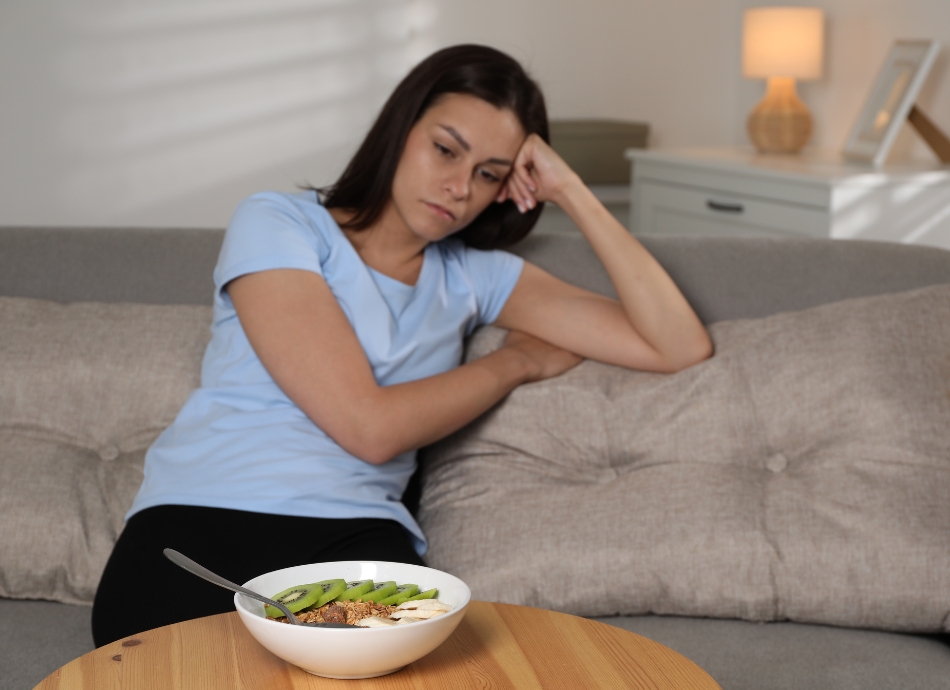If you're a frequent visitor to Healthify, why not share our site with a friend? Don't forget you can also browse Healthify without using your phone data.
Poor appetite
Key points about poor appetite
- Poor appetite, or loss of appetite, is when you don’t feel hungry and don't feel like eating.
- You may never have had much appetite or interest in food, or you may have lost your appetite when you used to enjoy eating.
- Loss of appetite can be caused by many things, including mental or physical illness, medicines, older age, pregnancy, stress or grief.
- Usually, you regain your appetite if there’s an underlying cause that gets treated.
- There are also lots of things you can do to help you get the nutrition you need if you’ve lost your appetite.

A poor appetite, or loss of appetite, is when you don’t feel hungry and have less, or no, interest in eating.
This can be due to things like mental or physical illness, medicines you’re taking, or a response to stress or grief. Changes in appetite are also common as we get older.
The medical term for loss of appetite is anorexia. This is different to the eating disorder anorexia nervosa, which is when you intentionally limit the amount of food you eat to lose weight.
Even if you don’t feel hungry, it’s important that you get the nutrition you need. If you lose your appetite and don’t eat anything, or eat very little, you may develop symptoms such as serious weight loss or malnutrition. This is why it’s important to find out what’s causing your reduced appetite.
There are things you can do to help increase your appetite or get more of the energy and nutrients you need.
A poor appetite may be due to:
- illness, including infections, cancer (eg, colon, stomach, pancreas or ovarian cancer), chronic liver, kidney or heart disease, dementia, diabetes, hypothyroidism, COPD, hepatitis
- medicines, including anticancer medicines, antibiotics, anti-seizure medication, antidepressants, diabetes medicines
- illegal drug use, eg, amphetamines, cocaine, heroin
- psychological causes, such as anxiety, depression, chronic stress, grief
- tiredness
- pain
- pregnancy, especially nausea during the first trimester – read more about morning sickness
- getting older.
If you have a poor appetite, you don’t feel like eating even if you haven’t eaten for a while. You may have little or no interest in food and so you miss meals.
If this goes on, you may develop more severe symptoms such as:
- extreme fatigue
- weight loss
- rapid heart rate
- irritability
- malaise (a general feeling of weakness, discomfort or being unwell).
- you've lost your appetite and are losing weight without trying
- your lack of appetite could be due to depression, prescription medicines, alcohol or illegal drug use, or an eating disorder such as anorexia nervosa or bulimia.
If there’s a possible underlying cause for your reduced appetite, or if it doesn’t improve with self-care measures, your healthcare provider will ask you about your appetite loss, including:
- how bad it is
- how long it's been going on for
- whether it started after an upsetting event such as the death of someone close to you.
They’ll also ask about what you are eating and drinking, any other symptoms (eg, weight loss or pain) and your medical history. They’ll do a physical examination and check your height and weight.
Tests that may be needed to find a cause include:
- an X-ray or ultrasound of parts of your digestive system, such as your abdomen (puku or tummy)
- blood and urine tests
- liver, thyroid and kidney function tests.
If you have a poor appetite, treatment will depend on what’s causing it. If your loss of appetite is caused by an infection such as the flu, or an emotional response, you may not need medical treatment. Your appetite will probably come back over time.
There are things you can do at home to help stimulate or increase your appetite (see the self-care section below). If these things don’t help, your healthcare provider will check for an underlying cause and treat this, if one hasn’t already been identified. You may be given medicine that increases your appetite.
If your loss of appetite might be caused by medicines you’re taking, your healthcare provider may change the dosage or the medicine – don’t stop taking any medicine without first talking to your healthcare provider.
It’s important to eat enough to keep up your strength and get the nutrition your body needs. Below are things you can do to help, even if you don’t feel hungry. If you’re a caregiver, you can encourage the person you’re caring for to try these things too.
- Have 4 to 6 smaller meals or snacks throughout the day instead of 3 main meals.
- Try to eat something every 2 to 3 hours rather than waiting until you feel hungry.
- Eat your favourite foods at any time of the day.
- Drink between meals rather than having fluids with meals as that tends to fill you up. Drink milk, juice, water, hot drinks or soup. Custard, jelly and ice blocks count as fluids too.
- Avoid drinking too many cups of low-calorie fluids like tea, black coffee and water. They'll fill you up but don’t give you the energy or nutrients you need.
- Have meals with whānau and friends if you can. Being social can prompt you to eat more. Otherwise, try eating while you watch TV or read to take your mind off the food.
- Serve your food on a small plate so you don’t feel overwhelmed.
- Add high energy and high protein foods to your meals. For example, cream, butter, milk, cheese, creamy sauces, meat, fish, eggs, legumes (eg, lentils and beans) and nuts. Snack on cheese, avocado dip, peanut butter on toast or nuts – these provide a lot of energy in small portions.
- Try foods you can quickly and easily digest, such as eggs, crackers, soup, spaghetti, macaroni cheese, chicken in gravy, mashed vegetables, milk puddings and stewed or canned fruit.
- Try different colours, flavours, smells and textures of food. Add herbs, spices, nuts and seeds or sauces to give your food extra flavour or texture.
- Have ready-made or pre-prepared food and snacks in your freezer of pantry for when you don’t feel like preparing food. Examples include soups, frozen meals, nuts, dairy desserts, cheese, crackers, and dip.
- If you don’t feel like eating at all, have a drink that's high in energy and protein instead. Try milk, milkshakes, smoothies, or supplements such as Complan or Vitaplan – these are available from supermarkets.
- Get some gentle physical activity to help stimulate your appetite. Try a short walk round your house or round the block before a meal.
- Talk to your healthcare provider to find out if a multi-nutritional supplement might be right for you. Also find out if any medicines you’re taking may be affecting your appetite.
Read more about managing unintentional weight loss and poor appetite.

Image credit: Freepik
If your reduced appetite is caused by a short-term condition, it will usually return to normal with no lasting effects once this has passed.
If you have a chronic (long-term) condition that’s affecting your appetite, it’s important that this is managed well and that you get support (eg, from a dietitian) to make sure you’re getting the nutrition you need.
It’s important to see your healthcare provider if you have loss of appetite with other symptoms, eg, weight loss, to help prevent serious complications that can develop if your body doesn’t get the nutrients it needs.
13 ways to increase your appetite(external link) Healthline, US
Brochures
Loss of appetite(external link) Queensland Health, Queensland Government, Australia, 2023
Tips for eating well with a small appetite(external link) Dietician Connection
How to overcome a poor appetite(external link) Health New Zealand | Te Whatu Ora, NZ
Living well with cancer – eating well(external link) Cancer Society, NZ
References
- What causes loss of appetite?(external link) Healthline, US, 2024
- Appetite – decreased(external link) Medline Plus, US, 2024
- Loss of appetite(external link) Queensland Health, Queensland Government, Australia, 2023
- How to overcome a poor appetite(external link) Health New Zealand | Te Whatu Ora, 2025
Credits: Healthify editorial team. Healthify is brought to you by Health Navigator Charitable Trust.
Reviewed by: Dr Emma Dunning, Clinical Editor and Advisor
Last reviewed:





